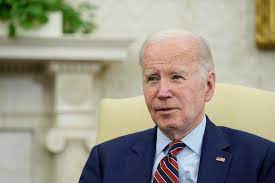Washington, May 18:US President Joe Biden said there is “work to do” on the global stage as he headed to Japan on Wednesday to consult with allies on Russia’s invasion of Ukraine and China’s assertiveness in the Pacific at the same time that a debt limit standoff looms at home.
With high-stakes talks to head off a federal default underway in Washington, Biden pledged to remain in “constant contact” with negotiators in the capital city while he conducts international diplomacy.
The president departed Washington aboard Air Force One a day after scrapping plans for a historic stop in Papua New Guinea and a key visit to Australia amid the showdown with House Republicans over raising the federal debt limit. The three-nation trip had been meant as a triumphant global leadership showcase, and instead threatened to become a truncated reminder of how partisan disagreements have undercut US standing on the global stage.
“I have cut my trip short in order to be here for the final negotiations and sign the deal with the majority leader,” Biden said in remarks before departing the White House. “I have made clear America is not a deadbeat nation, we pay our bills.”
For Biden, the intertwined dynamics of the debt standoff and his foray abroad put a spotlight on two key aspects of his presidency — his efforts to assert US prowess on the international stage and to address economic concerns at home. They also are playing out as Biden is in the early weeks of his candidacy for reelection, adding political overtones to the situation.
Aboard Air Force One en route to Japan, White House press secretary Karine Jean-Pierre said Republican House Speaker Kevin McCarthy put Biden in the bad position of cancelling part of the trip.
“He is taking the American economy hostage,” she said.
The president was still set to attend the annual Group of Seven summit of advanced democracies in Hiroshima, where sustaining support for Ukraine’s expected counteroffensive against Russia is set to take centre stage, alongside economic, climate and global development issues. More than a year after Moscow’s invasion, Biden and allies have armed Kyiv with ever-more-advanced weaponry and maintained deep sanctions on Russia’s economy, though maintaining resolve has grown more challenging in Washington and other global capitals.
While in Hiroshima, Biden also plans to sit down with the so-called Quad leaders of Japan, Australia and India, a partnership meant to serve as a counterweight to China in the Indo-Pacific, a region that he bills as a top priority in US national security strategy. That meeting had originally been scheduled to occur next week on what would have been his inaugural visit to Canberra and Sydney as president.
Off the agenda entirely is a stop in Port Moresby, Papua New Guinea, where Pacific Island leaders were to gather for a first-of-its-kind meeting with a US president. It was meant to be a rejoinder to China’s increasing military and economic pressures in the region. The US has recently opened embassies in the Solomon Islands and Tonga and has expressed a desire to reverse a decades-long pullback in the region.
No US president has ever visited the island nation, and high hopes for the visit were dashed by Biden’s announcement that he would not make the stop.
When asked whether he thought his shortened trip was a win for China, he said: “No.”
“Because we still work with allies,” he said.
White House National Security Adviser Jake Sullivan dismissed the idea that jettisoning the Australia trip would do any diplomatic damage or give China leverage, arguing Biden’s reputation as a strong ally would help soften the blow while acknowledging the disappointment, particularly in Papua New Guinea, the cancellation has caused.
“The work that we need to do bilaterally with Australia and with the Pacific Islands is work that can be done at a later date, whereas the final stretch of negotiations over the debt limit or the budget cannot be done at a later date,” Sullivan said.
During a roughly hour-long meeting in the Oval Office on Tuesday, Biden and McCarthy designated chief negotiators to try to draft an agreement to allow more government borrowing in conjunction with GOP-demanded spending cuts. The Treasury Department has warned that action is likely needed by June 1 to assure the US can continue to meet its financial obligations.
US officials have warned in increasingly urgent tones that a default would not only spark a deep recession, but also weaken its standing on the world stage.
“Countries like Russia and China that would love nothing more than for us to default so they could point the finger and say, ‘You see, the United States is not a stable, reliable partner’,” National Security Council spokesman John Kirby said on Tuesday. “So, that is a high priority, as it should be, for the president.”
For weeks, White House officials have said Biden could manage both the Capitol Hill negotiations and foreign commitments while on the trip. But in recent days, aides have fretted as McCarthy has repeatedly called for Biden to scrap his trip, worried that while abroad, the president would appear to the public as disengaged from the swelling crisis.
The instability of the cancellation could have the opposite effect of the initial purpose of Biden’s trip — reinforcing American commitments to the region, warned Charles Edel, a senior adviser and the Australia chair at the Centre for Strategic and International Studies.
“It would underscore for partners that despite welcome US focus on the region and the focus on allies and partners at the heart of US foreign policy, domestic politics is still a constraint on US engagement and perhaps on budgetary commitments as well,” he said last week. “And I think that is something that will be talked about widely.” (AP)


